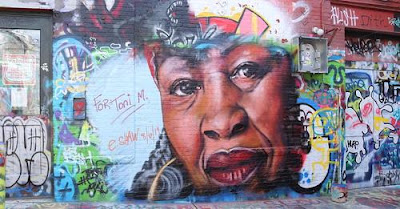—COUNT THE HEADLIGHTS ON THE HIGHWAY
Poetry Unbound / Padraig O Tuama, part one
“…in the end we go to poetry for one reason, so that we might more fully inhabit our lives and the world in which we live them, and that if we more fully inhabit these things, we might be less apt to destroy both.” Christian Wiman
Knowing how to say multiple things in a short space of time is a rich art.
Emily Dickinson once said that a good poem should take your head off.
It can be difficult to be kind to yourself. Even writing these words, I feel awkward, as if kindness towards myself is a luxury. Sometimes a poem helps me to step outside myself and let some wiser voice speak back to me, looking at my own failures with clear eyes, offering understanding and compassion. This, too, is a certain kind of bravery.
The things I say to myself are worse than the things I say to anyone else.
A single moment can open a door to an experience that’s bigger than the single moment might imply. Sometimes that opening is a challenge, sometimes it’s a comfort, other times a question. Very occasionally it’s an answer.
Sometimes it hurts to read a poem.
All griefs will need to be carried, and revisited. There’s wisdom in realizing we are not undone by such re-visitations. This, too, is part of letting go.
Another time, also in Union Square, I sat and listened to Hare Krishnas singing for an afternoon. I love the music of that tradition. A man sat next to me. Anyone looking at us would assume we knew each other, but we were strangers. After half an hour, he said, “Are you here because you need this?” I said, “I am.” “So I am,” he said. We spoke then, for a long time—two men in need—listening to the music and trying to figure out how to pay attention to our lives.
Greif is a complicated ghost; how a crowd of friends crammed in the back seat of the car is the whole world.
Every time a poet writes a poem, they give a shade of themselves a voice.
Often in life, a person wonders whether they’re alone. And when I say a person, I’m definitely referring to me, and hoping many others are with me, too. In wondering about aloneness, I often look for a text—a story, a poem, any kind of prayer—that can be some echo of someone else who is wondering what I’m wondering. In this way, poetry has become a conversational scripture to me.
Belief and doubt are part of the same thing.
My friend Daniel says that we all need five friends. When he says that he often also says, “I’ll be one of your five.” He’s a generous man.
Wiman is skilled enough as a poet to know that skill isn’t enough. He’s interested in pairing skill with love, observation with commitment, bewilderment with dedication.
Why are we lonely? Because we are alive. Why are we happy? Because we are alive.
People can destroy joy because they wish for it so much. It takes courage to welcome gladness while you’re carrying something else.
Isn’t advice one of the hardest things to ask for, and one the hardest things to take?
I think I had to learn to hate myself enough to grow up. Anger was its own intelligence, but I had to learn to listen, to turn away from turning it on others or myself. All this took time.
Say any word often enough and it’s likely to turn peculiar: word, word, word, wrrrd, wrd, whurrrd, whorrrde.
Every now and then Paul, my partner, will say, “I like you” to me. We’ve always been an affectionate couple, but those moments when he says like have a lovely quality to them. Maybe it’s just me, but somehow, I like you can feel more casual—but also more intentional—than love.

No comments:
Post a Comment